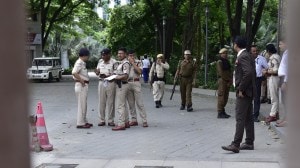Stay updated with the latest - Click here to follow us on Instagram
Hyperloop project: Will study and decide, Uddhav tells Branson
Branson met Uddhav at Matoshree to “seek cooperation” and gauge the new administration’s interest in the $ 10 billion project, which promises to cut the travel time between Mumbai and Pune to less than half and hour.
 Officials said while the project was discussed at the meeting, it was a courtesy visit, as Branson wanted to meet Uddhav and introduce the project to him. (PTI Photo/Shashank Parade)
Officials said while the project was discussed at the meeting, it was a courtesy visit, as Branson wanted to meet Uddhav and introduce the project to him. (PTI Photo/Shashank Parade)
CHIEF MINISTER Uddhav Thackeray on Thursday told Richard Branson, chairman of Virgin Hyperloop, that he would study the Mumbai-Pune Hyperloop superfast transport project and then take further decisions. Branson met Uddhav at Matoshree to “seek cooperation” and gauge the new administration’s interest in the $ 10 billion project, which promises to cut the travel time between Mumbai and Pune to less than half and hour.
Officials said while the project was discussed at the meeting, it was a courtesy visit, as Branson wanted to meet Uddhav and introduce the project to him. “A team of Virgin Hyperloop gave a presentation on the project to the chief minister. They sought cooperation from the CM for the project. The CM told Branson that he would study the project and then take a decision on it. But no decision was taken today,” an official said.
After Uddav took over the reins of the state, the government has been reviewing all big ticket infrastructure projects to check their current status, whether it is needed and to find a way forward to fast-track the same. Among projects being reviewed is the hyperloop project between Mumbai and Pune.
Speaking to mediapesons, Branson had said on Wednesday: “It is just a courtesy call (with Thackeray) and also to ensure that any misunderstandings regarding the project are cleared.” “When there is a change in administration and you have a big project going on, it is important to have a courtesy call. Uddhav Thackeray and the various coalition people he has around them need to meet people who are doing big projects or those wanting to do big projects,” he added.
The Fadnavis government had accorded infrastructure status to the hyperloop project that seeks to reduce the travel time between the two cities to just 23 minutes. The entire project involves construction across a length of 117.5 km and a 11.8-km test track, being developed in the first phase. The Pune Metropolitan Region Development Authority will oversee the implementation of the first phase, which is expected to take about two to three years to complete.







